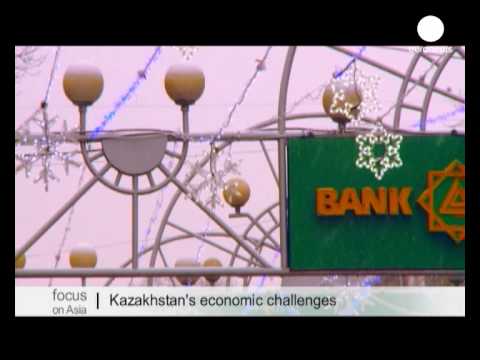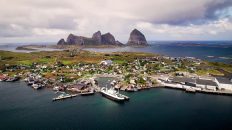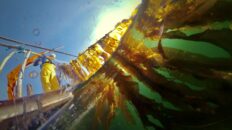As Kazakhstan – Central Asia’s largest economy – takes over the chairmanship of the Organisation for Security and Co-operation in Europe, it is seeking to strengthen the region’s economic security.
The world’s largest land-locked country favours the building of highways and pipelines between Europe and China, re-creating the historic Silk Road to encourage commerce.
However, Kazakhstan’s greatest concern right now is recovering from its own recession.
After years of boom-times, fuelled by high oil prices, the economy has slumped.
In response to the global crisis, Kazakhstan devalued its currency, took control of the country’s top banks and pumped billions in state money into the economy to get it back on track.
As President Nursultan Nazarbayev told euronews: “When companies were closing everywhere, we set up 170 new businesses. That allowed us to create 400,000 new jobs. The unemployment rate in Kazakhstan has not gone up, but rather it has fallen from 7.5 percent down to six percent, and it’s all been done using our own reserves”.
Kazakhstan’s rapid economic growth since the turn of the century came mostly from major foreign investment in the attractive Caspian oil sector.
Selling some of its vast oil and gas reserves built up big enough cash reserves to avoid economic and social collapse at the peak of crisis.
But it is a double edged sword. The country’s economy is fragile, based as it is on that abundance of oil and gas.
Kazakhstan’s struggling banking system proved to be another weak spot: it flourished on cheap liquidity which has now dried up.
The local banks’ troubles have allowed Western investors greater leeway, though some seem to be ignoring transparency issues and other peculiarities of the emerging market.
Simen Munter, chairman of the European Business Association of Kazakhstan, said: “It has its challenges, but it also has quite a lot of opportunities, and I think there’s a willingness in Kazakhstan to be attractive to foreign investors, and especially to foreign investors who are able to help develop the country”.
Government intervention may have worked as an emergency measure, but in the longer term the Kazakh economy needs profound reforms to make it less dependent on the energy sector and state control, according to economic expert, writer and columnist Aigul Tulembayeva.
Tulembayeva, who is a professor at Kazakh National University, said: “Those new jobs that we have – they are being created by the state, exclusively. And this is wrong – the economy needs to find internal resources, it must seek a way out by itself, it must balance and rebuild itself – but that is not happening. I mean, instead of moving forward, our economy stagnates.”
Which means it will not be easy to maintain the living standards enjoyed by many Kazakh citizens, with their newly acquired taste for expensive cars, designer labels and luxury apartments.
A 10-year industrialisation programme is planned, as well as major investment in Kazakhstan’s promising agricultural sector.
That should be able to support the economy, keep unemployment low and prevent food shortages for the immediate future.
But, according to local experts, the era of easy money is over.
Vyacheslav Dodonov is Chief Researcher at the Kazakhstan Institute for Strategic Studies.
He told euronews: “We can hardly expect to see over the next few years, the kind of soaring growth rates that there were in the 2000s, before the crisis; in the near future it’s unlikely that we’ll see growth rates of eight to 10 per cent. Kazakhstan’s economy in the coming years will grow steadily, though at quite a moderate pace.”
At the end of the day, economists agree, the crisis may help Kazakhstan by sobering it up after years of easy credit and putting the new chair of the Organisation for Security and Co-operation in Europe on the road to more sustainable and stable development.






Привет, Дэн! Я очень уважаю операторское искусство Терри, и мне приятно, что ты считаешь, что эту картинку снимал он. Но все же напомню, что это моя работа:)
Спасибо, Игорь, поправил! 🙂